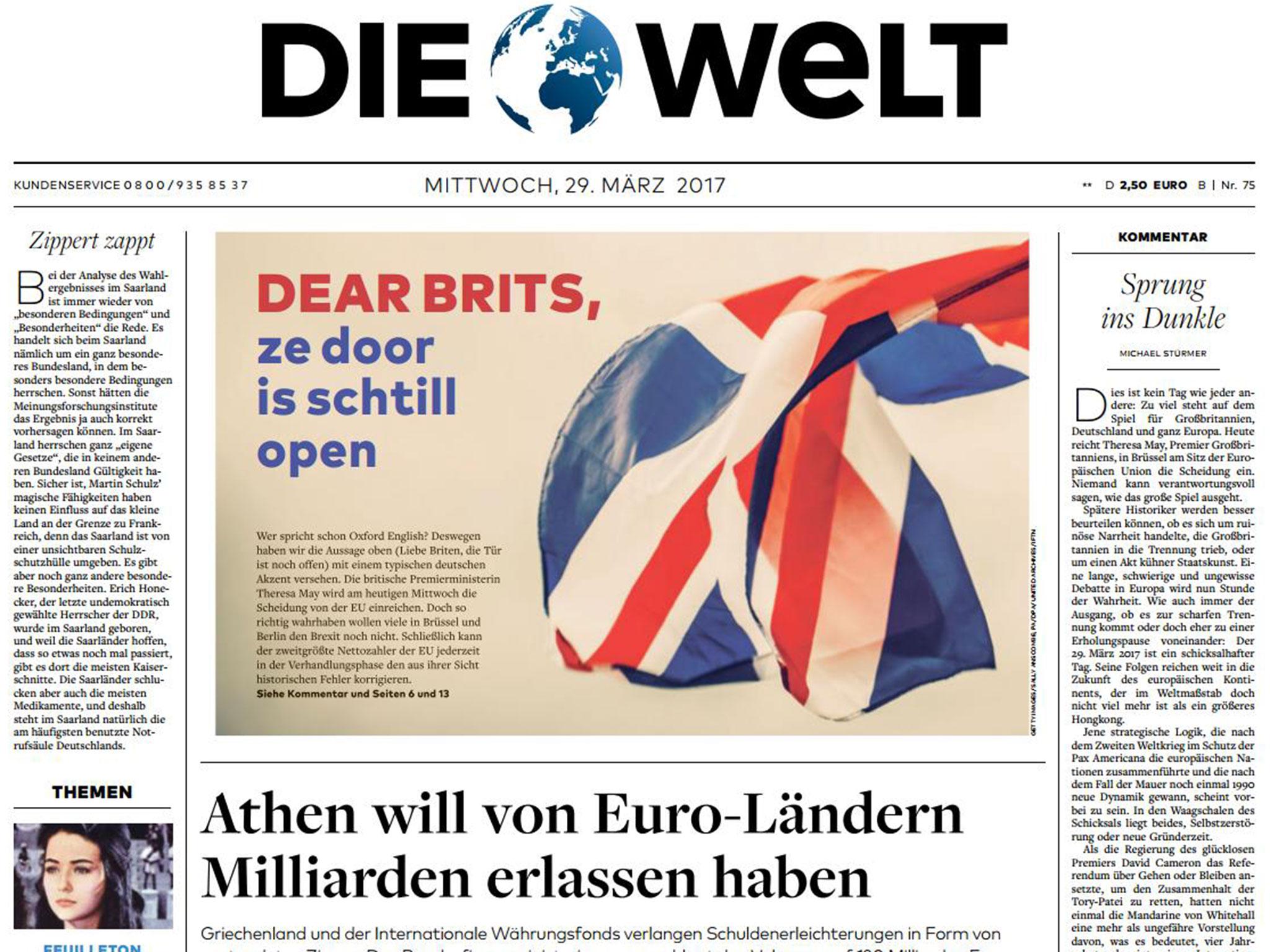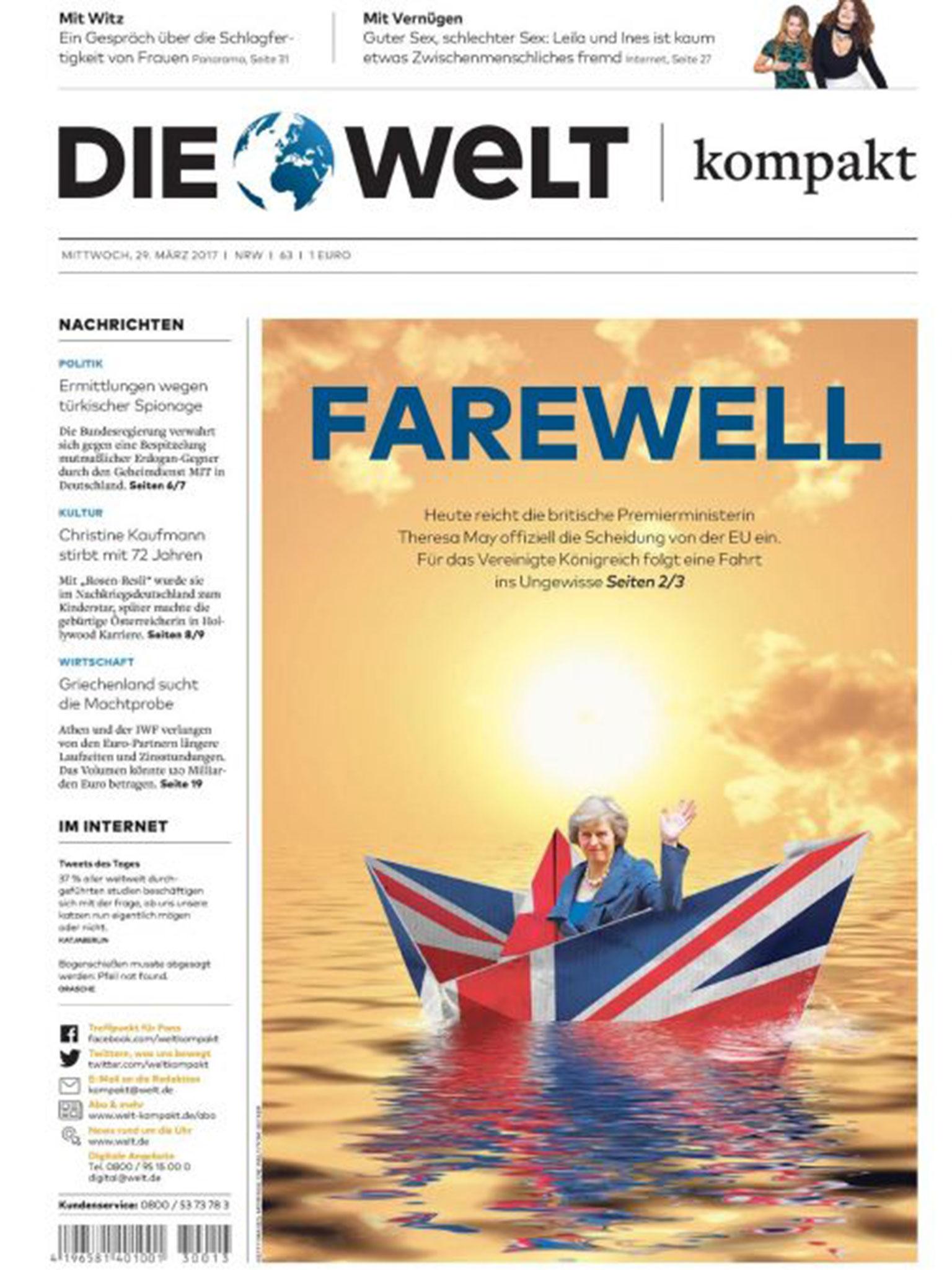'Dear Brits, ze door is schtill open': European newspapers react to UK triggering Article 50
'We miss you already! Or not...': European press warns of trouble ahead for UK

Your support helps us to tell the story
From reproductive rights to climate change to Big Tech, The Independent is on the ground when the story is developing. Whether it's investigating the financials of Elon Musk's pro-Trump PAC or producing our latest documentary, 'The A Word', which shines a light on the American women fighting for reproductive rights, we know how important it is to parse out the facts from the messaging.
At such a critical moment in US history, we need reporters on the ground. Your donation allows us to keep sending journalists to speak to both sides of the story.
The Independent is trusted by Americans across the entire political spectrum. And unlike many other quality news outlets, we choose not to lock Americans out of our reporting and analysis with paywalls. We believe quality journalism should be available to everyone, paid for by those who can afford it.
Your support makes all the difference.Britain has officially started the process of leaving the EU, with the triggering of Article 50 dominating front pages across Europe.
“Dear Brits, ze door is schtill open,” read the headline in German broadsheet Die Welt, emulating a “typical German accent” to get its message across to the UK.
It said that although Theresa May had started the split from the EU, many in Brussels and Berlin did not want Brexit to become reality.
“Ultimately, the EU’s second-largest contributor can correct its historic error at any time in the negotiations phase,” it added.
The front page of Die Welt’s “Kompact” sister edition featured headline “Farewell” with a picture of the Prime Minister sailing on a “voyage into the unknown” inside a paper boat made of a union flag.
Other German newspapers were similarly cutting, with the Frankfurter Allgemeine Zeitung warning that “divorce hurts” and the Stuttgarter Zeitung likening the upcoming negotiations to a “poker game”.

In France, Libération’s front page read “We miss you already! Or not…” warning that Britain could face a “rosy” future or a much gloomier alternative.
Le Monde also raised the alarm over the “consequences of the split” while in Belgium La Libre’s front page read: “Brexit: the cost of divorce”
Brussels-based Le Soir said Theresa May was signing “to end the Europe of 28”.
Aftonbladet said Brexit was a “strike against Sweden”, while Dagens Nyheter said Britain had pushed the EU to the “risk of collapse”.
Newspapers in Spain and Italy focused on Brexit’s impact on the rest of the EU and the UK itself, noting calls for Scotland and Northern Ireland to secede.
“London launches the process that will decide the future of Europe,” said El Pais, while La Repubblica warned that Scotland was “challenging London”.
In Poland, the Gazeta Wyborcza said it was sure that more than a million Poles already living in the UK would retain their rights but urged others to carefully consider such a move.
Mrs May launched negotiations with a letter to Donald Tusk, the President of the European Council.
She said the vote to leave the EU in June was “no rejection of the values we share as Europeans” or an attempt to harm the EU or its member states.
“The referendum was a vote to restore, as we see it, our national self-determination,” the Prime Minister wrote.
“We are leaving the European Union, but we are not leaving Europe – and we want to remain committed partners and allies to our friends across the continent.”
The letter set out principles for discussions, including that they should be carried out in the “spirit of sincere cooperation” but that citizens should “always be put first”, with disruption minimised and as much certainty given as possible.
“We want to play our part to ensure that Europe remains strong and prosperous and able to lead in the world, projecting its values and defending itself from security threats,” the Prime Minister wrote.
“The task before us is momentous but it should not be beyond us.”
Negotiators have two years in which to reach an agreement before the UK’s final withdrawal, under a process set out by the EU’s foundational treaty but not yet put to the test.
Amid concerns over rights for both immigrants and ex-pats, the value of the pound, single market access, security cooperation and waning international influence, the talks will remain divisive.
A new poll suggested the UK remained split over Brexit on Wednesday, with 44 per cent saying the decision to leave was right and 43 per cent wrong.
The YouGov survey found little appetite for a second referendum on the deal the Prime Minister secures in Brussels, with just 21 per cent backing the idea.
Join our commenting forum
Join thought-provoking conversations, follow other Independent readers and see their replies
Comments